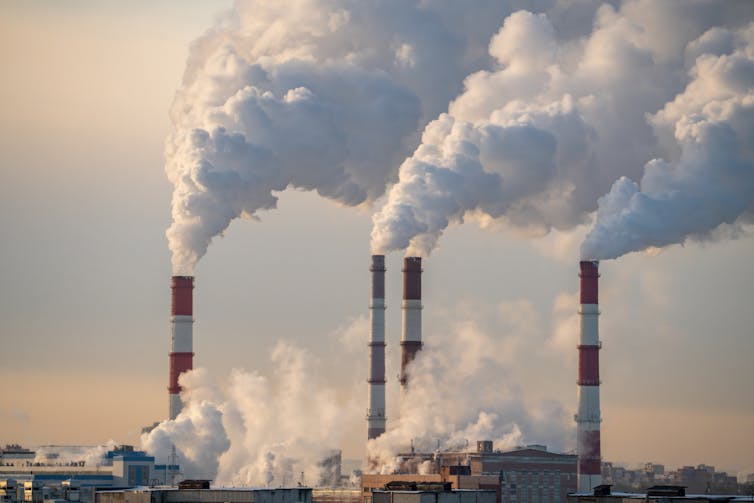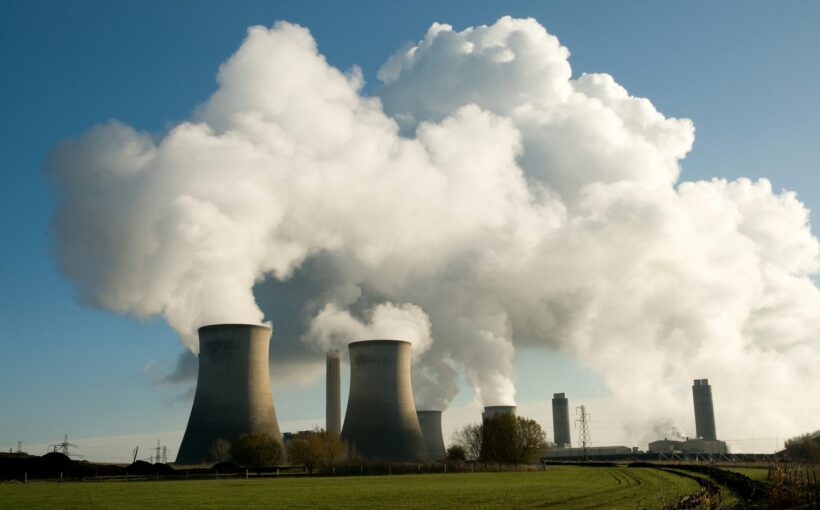Britain ended more than 140 years of coal power when it closed its last generator in September.
Coal emits more heat-trapping gas to the atmosphere than any other fossil fuel, so its demise as a source of electricity is an unalloyed good for the climate. Yet, with another announcement a week later, the UK government has helped extend the reign of fossil fuels well into the 21st century.
Less than six months from polling day, the UK Labour party (then the official opposition) scrapped a campaign commitment to provide an annual stimulus of £28 billion (US$36.6 billion) for green industries.
Six billion pounds shy of this figure will now be raised over 25 years, Keir Starmer’s Labour government has revealed, but for a specific purpose: carbon capture and storage.
“The technology works by capturing CO₂ as it is being emitted by a power plant or another polluter, then storing it underground,” says Mark Maslin, a professor of natural sciences at UCL.
The Guardian reports that oil companies BP and Equinor will invest in a cluster of carbon capture and storage installations in Teesside, north-east England. Eni, an Italian oil company, is expected to develop sites in north-west England and north Wales. In each case, emissions will probably be pumped via gas pipes beneath the seabed.
Starmer anointed “a new era” for green jobs when announcing this funding, but experts claim he is actually offering symbolic and strategic support to climate-wrecking energy sources that have dominated for centuries.
A new error
“This announcement represents a massive bet on a still unproven technology, and will lock the UK into fossil fuel dependence for decades to come,” Maslin says.
“The Climate Change Act mandates the UK should achieve net zero emissions by 2050, yet this will be impossible if carbon capture leads to the UK building new gas power stations instead of wind and solar farms.”

Maslin was one of several scientists who wrote to energy secretary Ed Miliband criticising the plans. As he sees it, the government would not fund these projects if it did not see a future for fossil fuels beyond the middle of this century, by which time scientists have said our interference in the climate must end.
The message is clear: expensive imports of natural gas (essentially methane, a potent greenhouse gas) are here to stay. Even successful deployment of carbon scrubbers at the point of burning this gas would not erase its climate impact, Maslin says, as it leaks at all stages of its production and use.
But Maslin also doubts carbon capture and storage can siphon off the emissions of gas-fired power plants without adding to climate change. This is why climate scientists often describe carbon capture and storage as an unproven technology for decarbonising electricity and heavy industry: most of its applications have been in natural gas processing facilities where CO₂ is extracted for commercial uses.
“The track record of adding carbon capture to power plants is much worse, with the vast majority of projects abandoned,” Maslin explains.
More damning still, almost 80% of all the CO₂ captured by existing installations has been reinjected into oil fields – to pump more oil.
Could carbon capture and storage tech turn natural gas into zero-carbon hydrogen, as some hope? Again, Maslin is dubious. Water is a cleaner source for hydrogen and using this fuel to heat homes or decarbonise factories is a second-rate solution compared with renewable electricity, he says.
The fruits of appeasement
Maslin and his co-signatories say that carbon capture and storage should be limited to reducing emissions from existing fossil power plants or steel furnaces while these emission sources are rapidly phased out.
Marc Hudson at the University of Sussex is a historian of climate politics and policy in Australia, the US, UK and internationally. He has encountered policy proposals for carbon capture dating back to the 1970s and in his view, their overwhelming effect has been to prolong the use of fossil fuels by justifying investment in their expansion.
“It’s the equivalent of smoking more and more cigarettes each day and gambling that a cure for cancer will exist by the time you need it,” he says.
When trying to explain why rational climate policies like the mass insulation of draughty homes tends to lose out to investment in carbon capture and storage, Nils Markusson, a lecturer in environmental politics at Lancaster University, found something similar:
“Home insulation does nothing to shield the profits of fossil fuel companies or landlords in the large and growing private rental sector,” he says.
In other words, appeasing the fossil fuel industry is a proviso of policies drafted to address climate change. This limitation has also infiltrated scientific assessments of the climate.
A new report shows that “overshoot” scenarios – that is, projections of future climate change which accept the global target of 1.5°C will be at least temporarily breached – are rife in mainstream climate science.
This is despite evidence of the permanent damage such a breach would cause – and our doubtful ability to reverse warming once it has exceeded these dangerous levels using speculative carbon removal technology.

What has led us here? Comprehending the climate crisis and its solutions on terms favourable to the fossil fuel industry say Wim Carton and Andreas Malm, political ecologists at Lund University.
“Avoiding climate breakdown demands that we bury the fantasy of overshoot-and-return and with it another illusion as well: that the Paris targets can be met without uprooting the status-quo.
“One limit after the other will be broken unless we manage to strand the necessary fossil assets and curtail opportunities for continuing to profit from oil and gas and coal.”
![]()



